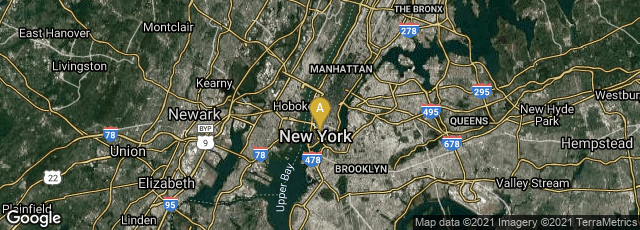

A: Manhattan, New York, New York, United States
On March 4, 1947 mathematician and Director of the Division of Natural Sciences at the Rockefeller Foundation in New York Warren Weaver sent the following letter to Norbert Wiener, suggesting that cryptanalysis techniques might be applied to translation, and that a computer could be built for the purpose. This letter, preserved at the Rockefeller Archives Center, may the origin of efforts at machine translation:
"Dear Norbert:
I was terribly sorry, when in Cambridge recently, that I got un- avoidably held up by several unexpected jobs, and did not get a chance to see you.
One thing I wanted to ask you about is this. A most serious problem, for UNESCO and for the constructive and peaceful future of the planet, is the problem of translation, as it unavoidably affects the communication between peoples. Huxley has recently told me that they are appalled by the magnitude and the importance of the translation job.
Recognizing fully, even though necessarily vaguely, the semantic difficulties because of multiple meanings, etc., I have wondered if it were unthinkable to design a computer which would translate. Even if it would translate only scientific material (where the semantic difficulties are very notably less), and even if it did produce an inelegant (but intelligible) result, it would seem to me worth while.
Also knowing nothing official about, but having guessed and inferred considerable about, powerful new mechanized methods in cryptography - methods which I believe succeed even when one does not know what language has been coded - one naturally wonders if the problem of translation could conceivably be treated as a problem in cryptography. When I look at an article in Russian, I say "This is really written in English, but it has been coded in some strange symbols. I will now proceed to decode."
Have you ever thought about this? As P. linguist and expert on computers, do you think it is worth thinking about?
Cordially,
Warren Weaver
In his reply dated April 30, 1947 Wiener was not optimistic regarding the possibility of machine translation:
"Dear Warren:
First, I want to thank you and The Rockefeller Foundation for the almost unlimited number of favors that I have been receiving. I think and hope, at any rate, that we shall be able to come across in such a way as to at least partly justify your expenditure.
Second - as to the problem of mechanical translation, I frankly am afraid the boundaries of words in different languages are too vague and the emotional and international connotations are too extensive to make any quasi mechanical translation scheme very hopeful. I will admit that basic English seems to indicate that we can go further than we have generally done in the mechanization of speech, but you must remember that in certain respects basic English is the reverse of mechanical and throws upon such words as "get," a burden, which is much greater than most words carry in conventional English. At the present time, the mechanization of language, beyond such a stage as the design of photoelectric reading opportunities for the blind, seems very premature. By the way, I have been fascinated by McCulloch's work on such apparatus, and, as you probably know, he finds the wiring diagram of apparatus of this kind turns out to be surprisingly like the microscopic analogy of the visual cortex in the brain.
"I have heard that your health is much better, and I certainly hope so. I shall try to look you up before I sail for France.
"Sincerely yours,
"Norbert Wiener
Weaver, however, maintained his belief in the possibility of machine translation in spite of Wiener's pessimism, writing back on May 9, 1947:
"Dear Norbert:
Thank you for your letter of April 30. I am sure that Dr. Morrison and I will both be very glad to have you tell us, from tine to time, about the progress of your collaborative program with Rosenblueth. And I will be most interested, after your re- turn from France, to hear your comments on your trip there.
"I am disappointed but not surprised by your comments on the translation problem. The difficulty you mention concerning Basic seems to me to have a rather easy answer. It is, of course, true that Basic puts multiple use on an action verb such as "get." But even so, the two-word combinations such as "get up," "get over," "get back," etc., are, in Basic, not really very numerous. Suppose we take a vocabulary of 2,000 words, and admit for good measure all the two-word combinations as if they were single words. The vocabulary is still only four million: and that is not so formidable a number to a modern computer, is it?
Cordially,
Warren Weaver"
(http://www.mt-archive.info/Weaver-1947-original.pdf, accessed 10-25-2011).